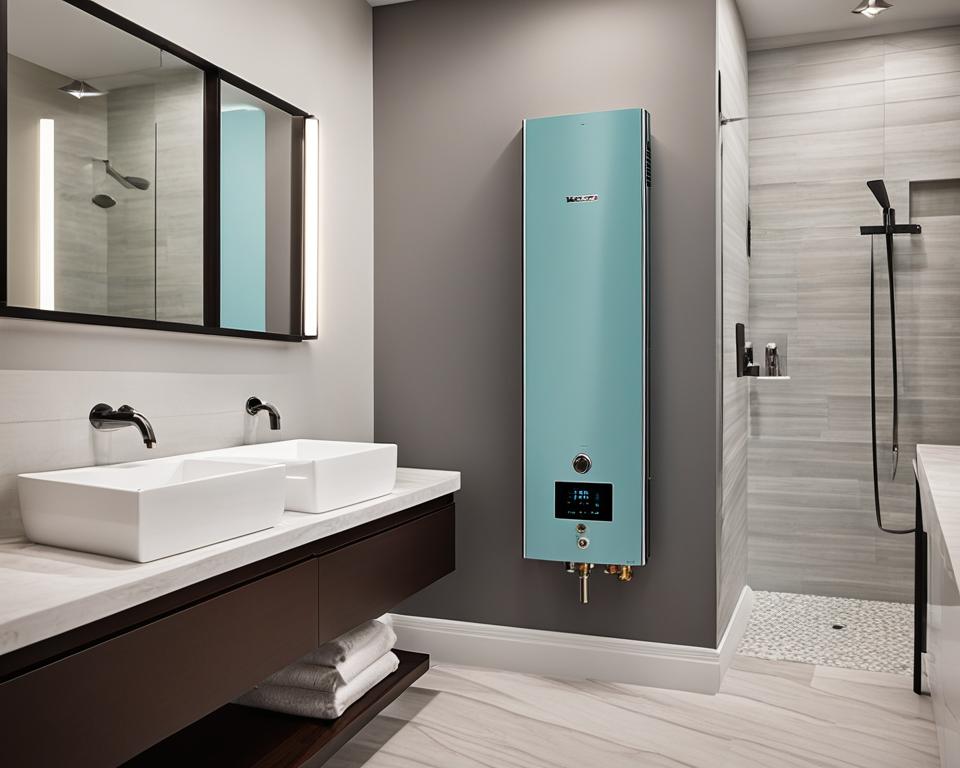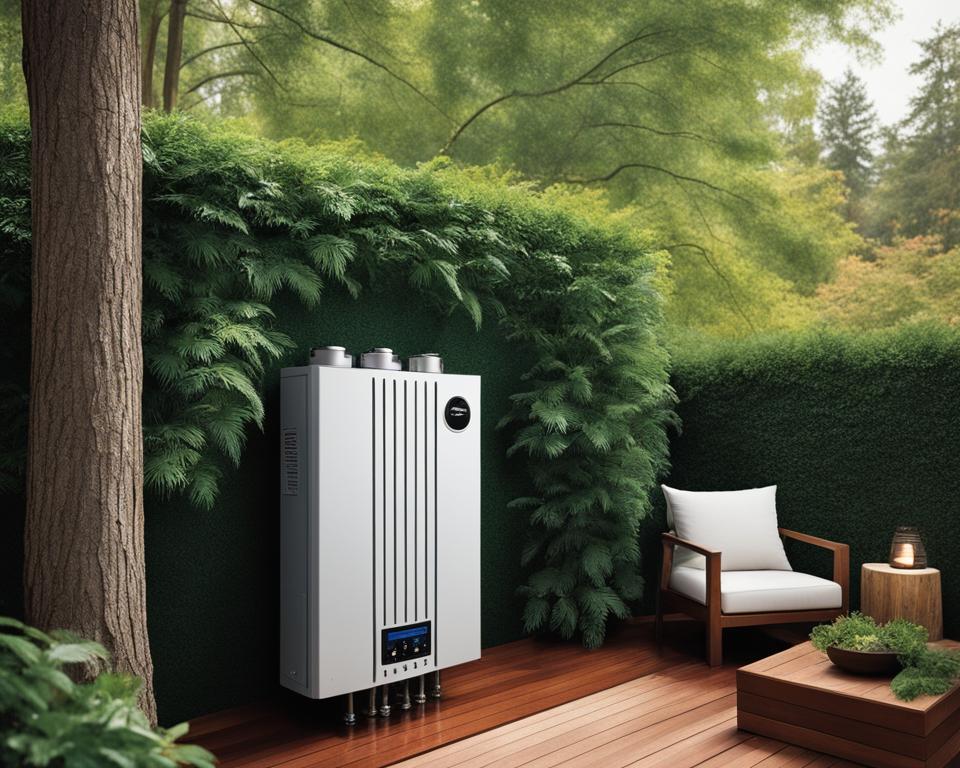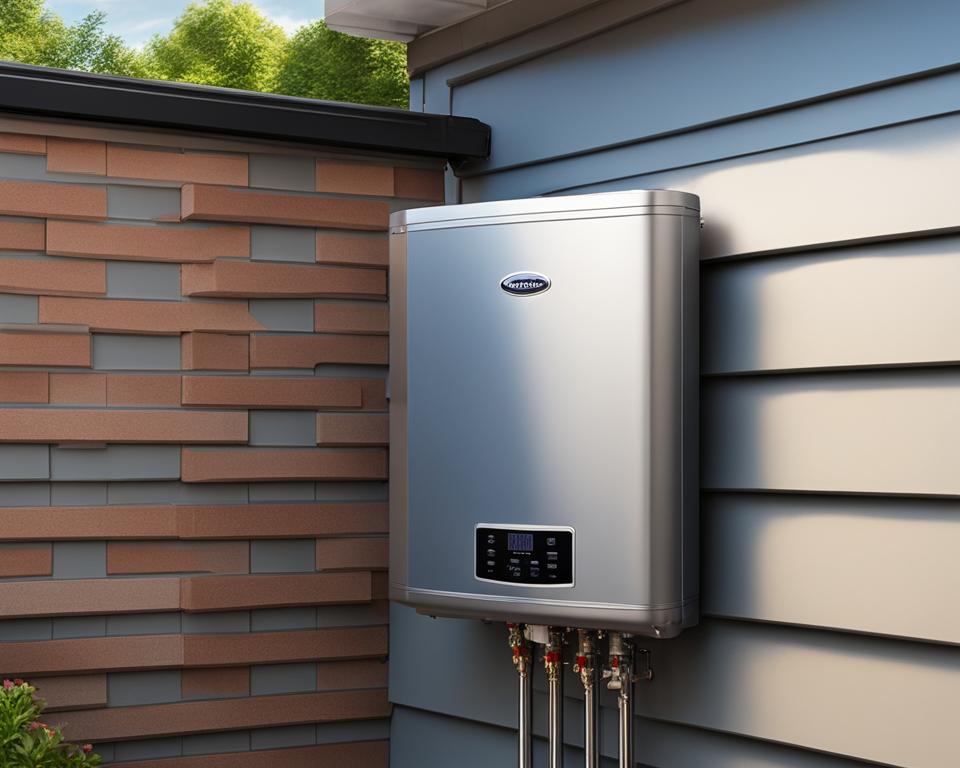Tankless water heaters are a popular choice for homeowners due to their space-saving and energy-efficient nature. However, deciding whether to install an indoor or outdoor tankless water heater can be a challenge. In this guide, we will explore the pros and cons of both options to help you make an informed decision.
Key Takeaways:
- Indoor and outdoor tankless water heaters offer benefits such as energy efficiency and space-saving.
- Indoor tankless water heaters are suitable for new construction homes and allow for customized installation.
- Outdoor tankless water heaters are durable, withstand various weather conditions, and are easier to install.
- Comparing indoor and outdoor tankless water heaters involves considering efficiency, space-saving, and longevity.
- Factors to consider include installation, cost, home type, hot water demand, and fuel types.
Benefits of Indoor Tankless Water Heaters
When it comes to choosing a tankless water heater, homeowners often opt for indoor models due to their numerous benefits. Let’s explore why indoor tankless water heaters are a popular choice, especially in new construction homes.
Customized Installation
One of the major advantages of indoor tankless water heaters is the ability to customize the installation to specific areas in your home. Whether it’s the bathrooms, kitchen, or laundry room, you can strategically place the unit to optimize hot water delivery where you need it most. This level of customization ensures a more efficient and convenient water heating experience.
Space-Saving Design
In addition to customized installation, indoor tankless water heaters offer a space-saving solution. These units are compact and can be mounted on walls or installed in small utility closets, maximizing your available space. This is particularly beneficial in new construction homes where every inch counts.
Take a look at the image below to see how a sleek indoor tankless water heater seamlessly fits into a modern home:

| Benefits of Indoor Tankless Water Heaters |
|---|
| Customized installation |
| Space-saving design |
As you can see, indoor tankless water heaters not only offer customized installation options but also help you make the most of your space. These advantages make them an ideal choice for homeowners, especially those embarking on new construction projects.
Benefits of Outdoor Tankless Water Heaters
When it comes to choosing the right water heater for your home, outdoor tankless water heaters offer a range of benefits that make them a compelling option. These innovative systems are designed to withstand various weather conditions, providing reliable hot water supply year-round. Let’s explore why outdoor tankless water heaters are a great choice for homeowners.
1. Weather Resilience
Outdoor tankless water heaters are specifically engineered to withstand extreme weather conditions, including snow, rain, and heat. Their robust construction ensures optimal performance, even in the harshest climates. This makes them suitable for homeowners living in regions with unpredictable weather patterns, where indoor tankless water heaters may not be feasible due to space constraints or specific accommodations.
2. Compatibility with Existing Homes
For homeowners with existing homes, finding the right water heater can be challenging. Unlike indoor tankless water heaters, which may require significant modifications to the home’s infrastructure, outdoor tankless water heaters offer an easier installation process. They can be conveniently mounted on an exterior wall, saving valuable indoor space and eliminating the need for complicated plumbing and venting systems.
3. Easier Installation
Outdoor tankless water heaters are known for their straightforward installation process. They typically come as whole-house systems, meaning they can supply hot water to the entire house without the need for additional units. Additionally, outdoor installation eliminates the hassle of venting, as the unit is installed outside and does not require complex ventilation systems. This makes installation quicker and more cost-effective, especially for homeowners who prefer a hassle-free setup.
| Benefits of Outdoor Tankless Water Heaters |
|---|
| Weather Resilience |
| Compatibility with Existing Homes |
| Easier Installation |
Overall, outdoor tankless water heaters provide a reliable and efficient solution for homeowners seeking a durable, space-saving, and easy-to-install water heating option. They are designed to withstand various weather conditions, making them ideal for existing homes. With their straightforward installation process, outdoor tankless water heaters offer a convenient and cost-effective way to supply hot water throughout the entire house.

Comparison of Indoor and Outdoor Tankless Water Heaters
When it comes to choosing between indoor and outdoor tankless water heaters, it’s important to consider various factors, including efficiency, space-saving capabilities, and longevity. Both options offer similar benefits in terms of energy efficiency and space-saving, making them a popular choice for homeowners.
Indoor tankless water heaters are smaller in size, taking up less space compared to their outdoor counterparts. This makes them a great option for homeowners with limited space or those who prefer a more compact and streamlined look. Additionally, indoor tankless water heaters are typically designed for specific areas, allowing for customized installation, such as dedicated units for bathrooms or washing machines.
On the other hand, outdoor tankless water heaters are whole-house systems that provide hot water to the entire home. They are larger in size and are usually installed outside, making them a convenient choice for existing homes where indoor installation may not be feasible due to space constraints or accommodations. Outdoor tankless water heaters are designed to withstand various weather conditions, including rain, snow, and heat, ensuring reliable operation all year round.
Both indoor and outdoor tankless water heaters offer excellent energy efficiency and are more efficient than traditional water heaters. They can help homeowners save on energy costs and reduce their carbon footprint. Additionally, tankless water heaters have a longer lifespan compared to traditional water heaters, providing homeowners with years of reliable hot water.
To help you visualize the differences between indoor and outdoor tankless water heaters, the following table presents a concise comparison of their key features:
| Indoor Tankless Water Heaters | Outdoor Tankless Water Heaters | |
|---|---|---|
| Size | Smaller, takes up less space | Larger, whole-house system |
| Installation | Customized installation for specific areas | Installed outside, suitable for existing homes |
| Weather Resistance | N/A | Designed to withstand various weather conditions |
| Energy Efficiency | Highly efficient | Highly efficient |
| Lifespan | Longer lifespan compared to traditional water heaters | Longer lifespan compared to traditional water heaters |
Ultimately, the choice between indoor and outdoor tankless water heater installation depends on the homeowner’s preference, space availability, and feasibility. Whether you opt for the space-saving convenience of an indoor tankless water heater or the whole-house coverage of an outdoor system, both options provide efficient and reliable hot water to meet your daily needs.

Factors to Consider when Choosing Between Indoor and Outdoor Tankless Water Heaters
When deciding between indoor and outdoor tankless water heaters, several factors should be taken into consideration to ensure the best choice for your home. These factors include installation, cost, home type, frequency of use, and fuel types.
Installation
The type of home, whether it is a new construction or an existing build, can significantly impact the ease and cost of installing a tankless water heater. New construction homes may have more flexibility in terms of placement and wiring, making installation relatively straightforward. On the other hand, existing homes may require more intricate retrofitting and additional expenses.
Cost
The cost of both the unit and installation should be carefully evaluated when considering the installation of a tankless water heater. Indoor tankless water heaters may involve additional expenses for venting and proper ventilation, whereas outdoor tankless water heaters generally require less complex installation.
Home Type
The specific type of home and its layout can also influence the decision between indoor and outdoor tankless water heaters. Homes with limited indoor space or where space is at a premium may benefit from the compact nature of indoor tankless water heaters. Conversely, homes with adequate outdoor space may find outdoor tankless water heaters more convenient for installation and maintenance.
Frequency of Use
The frequency and demand for hot water in your household should be taken into consideration. Homes with a high demand for hot water due to larger families or multiple bathrooms may require the continuous supply provided by outdoor tankless water heaters. Conversely, households with lower hot water consumption may find indoor tankless water heaters sufficient for their needs.
Fuel Types
The availability and preference of fuel types should also be considered when choosing between indoor and outdoor tankless water heaters. The most common fuel types for tankless water heaters are natural gas, liquid propane, and electric. Depending on your location and infrastructure, some fuel types may be more accessible or cost-effective than others.
| Factors | Indoor Tankless Water Heater | Outdoor Tankless Water Heater |
|---|---|---|
| Installation | Requires venting and proper ventilation | Easier installation, less complex |
| Cost | May involve additional expenses for venting | Generally less expensive |
| Home Type | Space-saving, suitable for homes with limited indoor space | Convenient for homes with adequate outdoor space |
| Frequency of Use | Sufficient for households with lower hot water consumption | Continuous supply for homes with high hot water demand |
| Fuel Types | Dependent on availability and preference | Dependent on availability and preference |
By taking into account these key factors, you can make an informed decision regarding whether to install an indoor or outdoor tankless water heater. Consider the specific needs of your home and evaluate the benefits and limitations of each option. Remember to prioritize factors such as installation, cost, home type, frequency of use, and fuel types to ensure the perfect choice for your hot water needs.
Conclusion
After carefully considering the benefits, comparison, and factors to consider, homeowners can confidently make an informed decision when choosing between an indoor and outdoor tankless water heater. Both options provide energy efficiency and space-saving advantages, ensuring a continuous supply of hot water.
For those building new construction homes, indoor tankless water heaters offer the advantage of customized installation, allowing homeowners to cater to specific areas and maximize space utilization.
On the other hand, outdoor tankless water heaters are a great option for existing homes, especially when indoor installation is challenging due to space constraints. These outdoor units can withstand various weather conditions, making them a reliable choice for homes exposed to snow, rain, or heat.
Ultimately, the decision between indoor and outdoor installation will depend on individual preferences and the specific requirements of each home. By considering factors such as installation ease, cost, fuel type availability, and hot water demand, homeowners can make a choice that meets their needs and ensures long-term satisfaction.
FAQ
What are the benefits of installing an indoor tankless water heater?
Indoor tankless water heaters offer the advantage of customized installation in specific areas, such as bathrooms or washing machines. They are also space-saving and can be installed close to the water source.
What are the benefits of installing an outdoor tankless water heater?
Outdoor tankless water heaters are weather-resistant and can withstand various weather conditions, making them suitable for existing homes where indoor installation may not be feasible. They are also easier to install and can supply hot water to the entire house.
What is the difference between indoor and outdoor tankless water heaters?
The main difference is the location of installation. Indoor tankless water heaters are smaller and take up less space, allowing for customized installation. Outdoor tankless water heaters are typically whole-house systems and can withstand various weather conditions.
What factors should be considered when choosing between indoor and outdoor tankless water heaters?
Factors to consider include the type of home (new construction or existing build), the ease and cost of installation, the frequency of hot water usage, and the availability of fuel types. These factors will help determine the best option for your specific needs.
